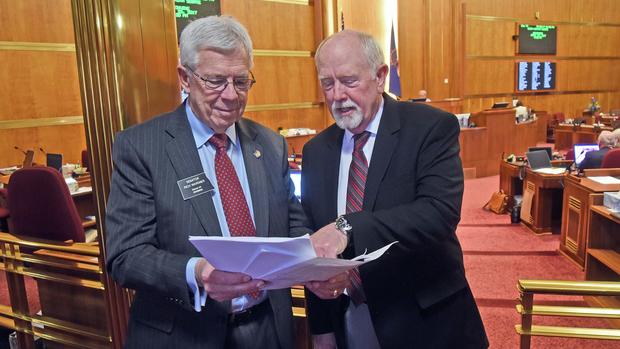Audio: Majority Leaders Carlson and Wardner Call for Local Spending Cuts to Avoid Property Tax Hikes

TOM STROMME/Tribune Senate majority leader Sen. Rich Wardner (R-Dickinson), left, and House majority leader Rep. Al Carlson (R-Fargo) review amendments for legislation before a meeting on Tuesday afternoon in the state capitol.
Yesterday I had House Majority Leader Al Carlson and Senate Majority Leader Rich Wardner on my radio show on 970 WDAY (podcast) to recap the legislative session.
The big thing on a lot of people’s minds heading into this interim, and the 2018 election cycle, is property taxes. Every press release I’ve seen from the politicians since the session adjourned earlier this week has mentioned property taxes. Republicans are touting property tax relief. Democrats are warning that property taxes are probably going up.
Wardner and Carlson seem to feel that the fate of the issue lays with the local governments.
“Your math is correct,” Wardner told me when I pointed out that the take over of local social services doesn’t make up for all of the state funding lost when lawmakers declined to renew the 12 percent property tax buy downs they’ve been doing the last few sessions. “It’s around a $100 million difference,” he continued.
That difference will fall to the local governments. How they respond to it will impact what our property tax bills look like in 2018. Wardner told me he hopes they respond to it with spending cuts of their own.
“I believe that the political [subdivisions] need to trim their budgets too,” he told me.
Carlson agreed, adding that local governments have been allowing rising property values drive automatic spending increases. “These political subdivisions haven’t been lowering their mills,” he said.
[mks_pullquote align=”right” width=”300″ size=”24″ bg_color=”#ffffff” txt_color=”#000000″]”I believe that the political [subdivisions] need to trim their budgets too,” he told me.[/mks_pullquote]
I asked the leaders about the Senate’s failure to pass a cap on property tax increases which the House sent them. “We didn’t get enough reform done,” Carlson said of that situation, but Wardner says he and the Senate (which killed the cap bill unanimously) don’t agree with that approach.
“We have a philosophical difference,” Wardner said, but he went on to point out that the state is still spending a lot of money on keeping local property taxes low.
“Property taxes make up 29 percent of our general fund budget,” he said, referring to the state’s increased contributions to K-12 budgets, instituted in past sessions, as well as this session’s take over of local social service spending. He also said that people (including me) criticize the Legislature for “spending too much,” which I’ll admit does represent a quandary for lawmakers.
If they don’t buy down local property taxes then those taxes probably go up. But the more they buy them down the larger the state budget gets. It’s really a no-win situation for policymakers at the state level.
This debate needs to go back to the local governing entities, but will it?
It seems to me that the state is in this situation because the local governments and their lobbyists were successful in creating the perception with the public that property taxes are somehow the state’s problem.
On a different note, I asked the leaders about missing multiple self-imposed deadlines for adjournment. I shared with them a comment a Republican lawmaker had made during the last week, saying it was “pretty embarrassing we’re still here.”
Carlson attributed the delays to “some differences of opinion” on policies such as self-funded insurance for state workers, but added that “we found compromise.”
He said the “secret” to a successful session is to take the time to “get it right.”
Here’s the full audio:
[fcc_jw_podcast key=”qgTGPvWQ” player-image=”139345″]




